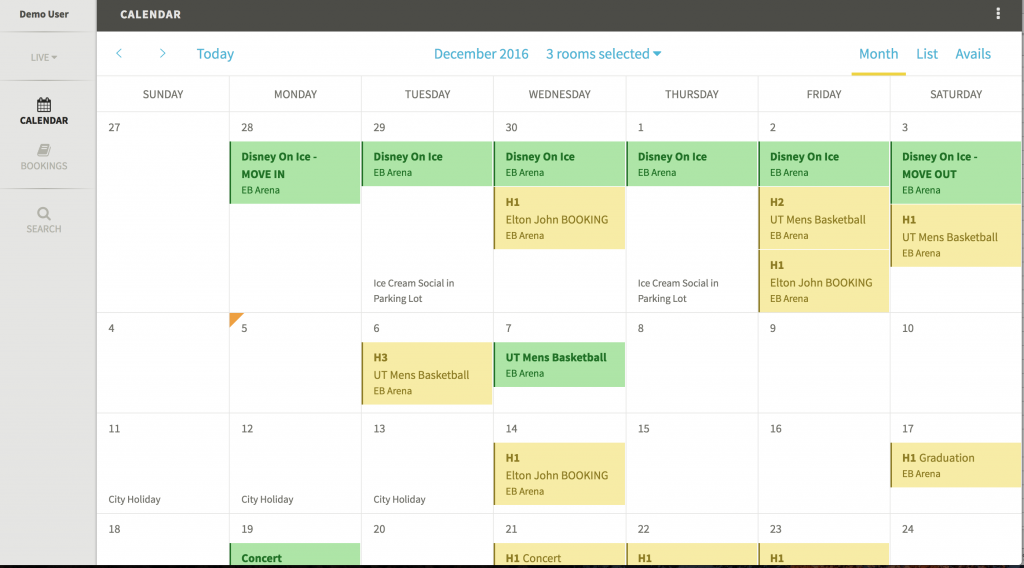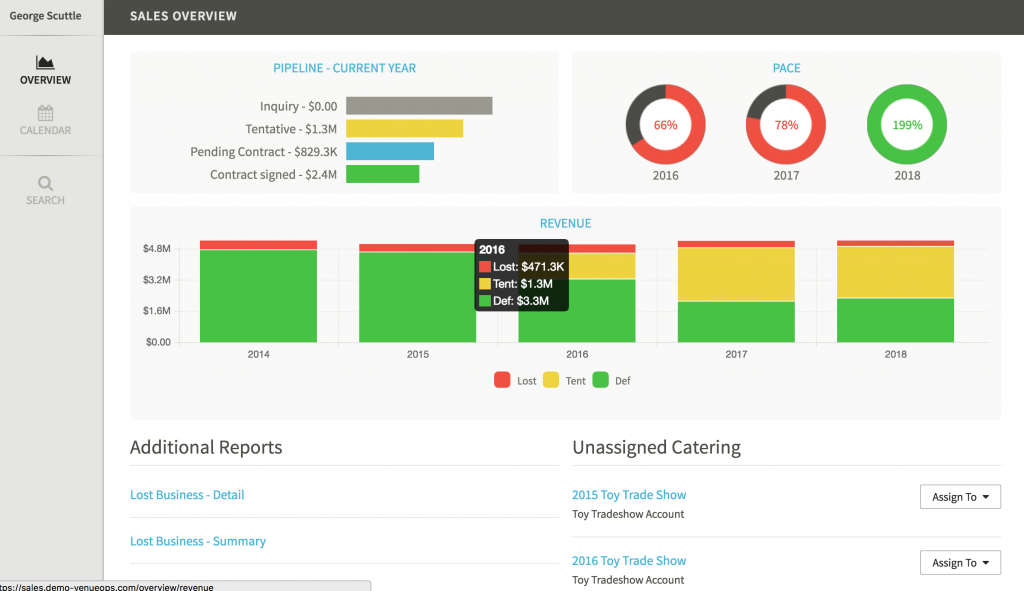- December 5, 2016
- Posted by: SportsV
- Categories: Event News, Features, Home News, Industry News, Interviews, News
No Comments

Katie McIntyre hears from Steve Mackenzie (SM), President at EventBooking, regarding the latest ‘hot topics’ affecting the sector. Steve is not only an instructor at the VMA’s (Venue Managers Association) Venue Management School but has also just been confirmed as an instructor for the IAVM’s (International Association of Venue Managers) Venue Management School and he is also a regular speaker on Event Technology at conferences around the world.
Steve, you took over as President at EventBooking some six months ago now. What were the main goals and challenges you needed to overcome? And how are these coming to pass?
SM: Yes, it’s been a whirlwind six months, our main goal was for me to add my experience in setting the next phase of global growth for us as a company, as we launch our newest venue management technology into the market. So the challenge has been to build on our stellar reputation and product we already have in the Stadia/Arena market to educate the wider market of other event facilities that we now have a product to suit their needs as well. Luckily, we have an amazing team behind the scenes so all I need to do is offer a little guidance and they take care of the real work. One of the keys to successful growth is ensuring we never forget why our clients like us in the first place, and that’s a big goal of mine – making sure the amazing customer service our clients love about us as a company providing software to 600+ clients is the same when we provide software to 10 times that amount.

What kinds of developments, i.e. new products, enhancements of existing solutions &/or module updates, etc., does Eventbooking have in-the-works?
SM: Our latest product is called VenueOps and is by far and away the easiest to use venue management software I’ve seen in 23 years of being involved in event technology. The product is in BETA phase right now, being put through its paces by a number of existing clients and some non-clients too, and the feedback from this is really helping us to fine-tune the product in preparation for our “official” launch of the product in January.

I understand you are an instructor for VMA and IAVM. Can you tell us a bit more about how this came about and what kinds of topics are covered?
SM: The Venue Management Schools run by the IAVM and VMA are something I am extremely proud to be part of – being able to pass on knowledge to the next generation of venue managers. The school has been running in the USA now since 1987 and in Australia since 1994. It’s a week long course that runs over 2 years for each student, with an exam each year and then a graduation at the end of the second year. The course is designed to teach the attendees all aspects of managing a venue, with almost 40 classes covering topics such as Marketing, Business Planning, Crowd Management, Technology, Communications, Media Relations and many more crammed into the week.Both schools have a Graduate Institute (GI) class as well. Having been through the school as a student, I would highly recommend anyone in the venue industry who wants a long term career in this field to consider applying to attend. The benefits don’t just come from the education, the relationships and bonds made with your peers during this school are some of the strongest you’ll make in the industry.
When it comes to trends in booking systems, i.e. cloud versus in-house, unlimited user models, etc., what options offer the greatest ROI and benefits for events, clubs and venues?
SM: Like all things, each venue or club is going to have different needs, but the overall trend in this area right now is definitely towards cloud- based solutions. These free up the IT team to focus on other tech instead of worrying about deploying upgrades, backups, security etc.We are also very much of the mindset that these type of systems offer the most ROI and benefit when everyone that needs access gets access, therefore we heavily promote the concept of unlimited users since this is usually the main reason a business is putting a system in place, to facilitate enterprise wide communication. Being penalized by having to pay per user is an old school way of thinking and has no place in the venue technology world in my opinion.
In regards to mobile apps, we’ve seen a huge rise in the number of clubs & venues getting in on the act. How can they ensure they get the best app tailored to their needs and their fan base?
SM: If I had to identify one single technology over the past 5 years that has had the biggest impact on our industry it would be mobile. And this is largely because our fans and attendees now have the ability to be more engaged than ever before. The key for a venue or a club when deciding on putting an app in place is to first ask the question: “What do I want to achieve?” Once you have identified your goals from the app – whether it be things such as in-seat ordering, access to replays, social media engagement, seat upgrades, whatever – then you’re halfway there. Just putting an app in place because everyone else is doing it is not a good strategy. Some of the things that work well for one venue or club will not work for another, so no point offering them.

What benefits can clubs & venues hope to achieve through the use of beacons, drones and wearable technology?
SM: Beacons are popping up in a number of venues now, sending low frequency bluetooth signals out to the attendee’s smartphones offering concession discounts, venue information and a lot of other “real time” information. Expect to see more of this in the next year or two.Drones are a fantastic way to get a different perspective on events for video and photography, however most countries still have regulatory issues around the airspace and security issues in general. But as companies like Amazon and Google continue to push for more mainstream use of drones, we should expect a flow on effect into the events industry.Wearable tech is becoming increasingly popular as a way to incorporate the attendees into the event, whether it be wristbands like we’ve seen Taylor Swift and Coldplay use on their recent world tours by having everyone’s wristband flash and change color in time with the music, or by embedding RFID chips in fan’s apparel, so they can use these to purchase items while at the event. It’s a really exciting area of engagement that we are just starting to scratch the surface with!
Can you outline for our readers some of the latest advances in VR and AR technology, and what it means for them?
SM: I think the general reaction to Virtual Reality (VR) when it was first talked about for events was one of “competition” – thinking that a VR experience would mean a person would therefore not need to attend the event to get the same experience. This is certainly not the case, as we are now seeing venues use VR to enhance the experience instead. A theme park where I live actually offers VR headsets to people riding a rollercoaster so they are “transported” to a fantasy world of shooting aliens while going into a 360 loop, but you still do the loop! It’s a crazy, mind-bending experience! But there’s plenty of other uses for VR – tours of the venue (both front of house and back of house), seat views, and so on.And Augmented Reality (AR) offers many options to a venue or club too, but I think one of the best uses of this I’ve heard about is for security training, specifically for training staff in an active shooter environment. Obviously you can’t ever train this in a real environment, so having an AR environment is the next best thing!
How can clubs & venues utilise big data and personalisation to optimum effect?
SM: Everyone has heard the term “Big Data” being bandied around for a few years now but most of us still don’t really know what that really means. We’re all sold various technologies on the importance of collecting information about our clients/fans/attendees but what do we do with all of this data when we’ve got it? The idea of Big Data is to offer us a way to better understand our audience and their individual wants, preferences and habits. And then using this data to engage with the individual in a relevant and interesting manner that they will see as beneficial.For example, as a member of a club, I only want to receive information that is meaningful to me, not a generic message that you send to all members. I will take the time to read that and maybe even buy something as a result because it speaks directly to my preferences. So that is the key – having a technology solution that allows you to gather data from several different areas (membership database, social media crawling, ticketing database, etc.) and then personalizing the way you interact with your member based on this.
How important is supplier collaboration?
SM: I believe this is the way of the future. Gone are the days where one system can supposedly do everything, or where a standalone piece of software is accepted as working in isolation. As technology suppliers to the industry, we have a responsibility to our clients to provide them with the way to combine information for the very reasons listed above – so you can better engage with them. But in addition to this, collaboration between technology suppliers should help facilitate smoother operations, cut out time consuming duplication of entry and help communication in general. Technology has become so specific these days that it is naïve to think that one system can handle everything you need. Technology companies that embrace collaboration rather than oppose it will be the ones that survive and thrive.
What kinds of developments/evolutions do you foresee for the sector, specifically in terms of venue management software, online booking solutions, etc., moving forward?
SM: Venues want software that is easy to use and creates efficiency. These two things are not mutually exclusive. Venues do not want to spend a year implementing a new system, and it’s not just the money this costs – it’s the time. Those days are way behind us now. If a solution can’t be up and running in a matter of weeks, forget it.Plus, as I mentioned above, the tech providers have to move away from selling by the user – this stifles communication and efficiency within a venue.One of the other major shifts I see happening is venues looking to maximize their space rental by utilizing avenues like we see within industries like Hotels and Travel – last minute marketplaces to sell space that otherwise will sit empty. Whilst a lot of venues don’t want to give up control over who books their space, there are many venues that have rooms that they will indeed be comfortable doing this with after it becomes apparent they won’t be able to rent that space in a realistic timeframe using their normal sales process. So I see venue software applications being linked directly to these marketplaces to ensure no duplications, etc., take place.I have no doubt the future holds a lot more for us all too, the key as a technology provider is being willing to accept change and be proactive with the venues in embracing this change!

